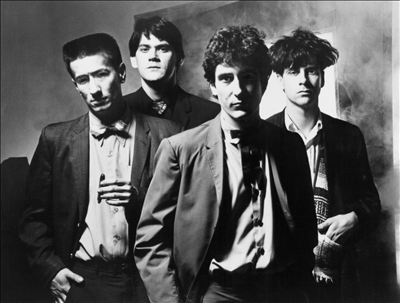I witnessed Wall of Voodoo for the first time at the Urgh concerts in Santa Monica in 1980, sharing the bill with Pere Ubu, Dead Boys, Magazine,a wholly transformational encounter. The band applied the ticktock reductionist rhythms with a sense of apprehension. It was almost Hitchcockian, as in any scene when a nervous protagonist under duress hears an overly loud clock ticking away . "Ring of Fire" was masterfully drawn out, and Stan Ridgeway seemed to me the best talk-singer since Lou Reed , a flat, hardened monotone , leering and braced by a slight ironic tone, reflecting LA Noir no less than Marlowe. "I Can't Make Love" was my takeaway from the entire night, an underrated lament of A loser, battered on both sides by the lure and dispatch of the affection he craves. This is a lament of someone so saddled with self loathing that he can't complete a sentence. The pleading refrain of "I'm a nice guy" as the song fades is stark and stripped of illusion, it is Lear without the poetry. The abject despair and self-pity that's revealed is equal parts moving and repulsive, which is a remarkable accomplishment.
__________________________________
The Band's rendition of Tears of Rage, cowritten by Bob Dylan and Richard Manuel, ranks as one the greatest interpretations of a Dylan lyric ever to meet the public ear. One of Dylan's most subtle, evocative, and melancholy lyrics. It exhibits every strength he possessed as a wordsmith when he was at the height of his power, elliptical, diffuse, surreal in the way it can be a snapshot precise in detail and yet remain elusive as to final meaning. Richard Manual's melody, a brooding, and morphing tone poem with quirky shifts in emphasis and patterning and yet maintaining a gospelish flavor, and his vocal I find utterly heartbreaking in its suggestion of a rural family tragedy, incest, insanity. His singing is soulful and mournful , equal parts soul and country wail. He gives Dylan likely the best reading of one of his lyrics to grace vinyl.
____________________________________
In his 1969 book Rock from the Beginning, corrosive critic Nik Cohn maintained that Dylan wrote his best lyrics when he was being mean spirited and out to settle accounts in his rhymes. I'm inclined to agree in part with that; the Dylan who wanted to slay dragons, deliver payback and indict the previous generations for the foulness of the world they brought him into is the Dylan that wrote the most memorable lyrics and are the foundation to claims for his genius. In many ways, Like A Rolling Stone was a prototype for what eventually became rap , where the talking blues tradition Dylan emulated early on morphed to the sardonic talk-sung bray of "Rolling Stone" . And of course, there are several Dylan songs from the time that would fit the same description, Its Alright Ma, Masters of War, Gates of Eden, Desolation Row. But I thought Like a Rolling Stone in particular begged for a hip hop rendition, to how Dylan's dread, anger and agitated rhymes would hang with different generation's beats.
____________________________________________________



